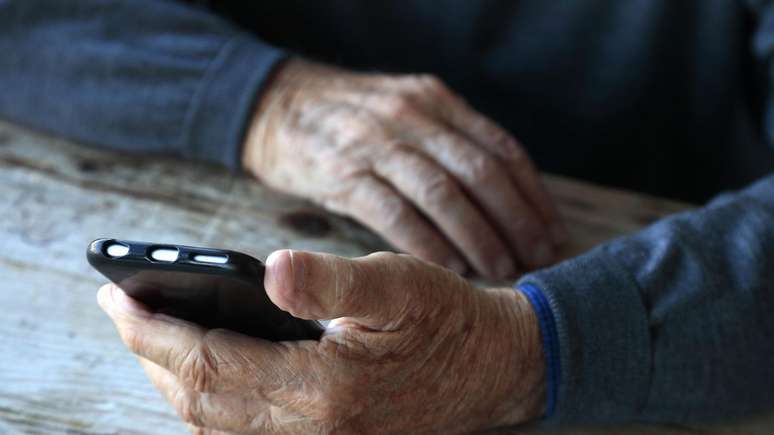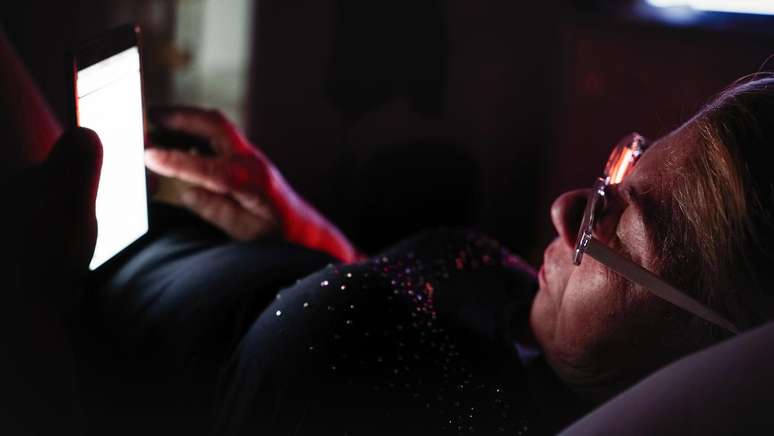Older people are already a vulnerable group to mobile phone addiction, which can lead to isolation from family and problems related to gambling and scams.
In Ester’s family home in the hinterland of São Paulo, the Wi-Fi is turned off. The 38-year-old senior caregiver and her siblings also avoided using cell phones when they are together.
The family’s sudden decision to go offline is an attempt to bring one person “back to real life”: Ester’s mother, who is 74 years old.
“She is very dependent: she takes her cell phone to the bathroom, she sleeps with her cell phone under her pillow, she doesn’t interact and doesn’t let us near her cell phone. She looks like a child,” says Ester, who prefers to keep her mother’s name and family surname to avoid embarrassment.
In a more drastic measure, the children even removed the chip from their mother’s phone, to prevent the elderly woman from accessing mobile data and, therefore, stop accessing Facebook and TikTok.
“We turned off the Wi-Fi and removed the chip from his phone because there was no other way,” says Ester.
The case of the family from San Paolo illustrates a phenomenon that has emerged in recent research on the damage caused by cell phone addiction: the so-called nomophobia, an expression that derives from the English on your cell phone (no cell phone).
It is not considered a disease or disorder, but a set of symptoms exacerbated by this unhealthy relationship with electronic devices.
In some cases, the fear of being without a cell phone can make a person so nervous that they sweat excessively or have a rapid heartbeat.
Excessive use of screens is linked to worsening mental health, with symptoms of stress, depression and anxiety, according to research collected in a study conducted by occupational therapist Renata Maria Santos during her doctorate at the University’s Faculty of Medicine Federal of Minas Gerais (UFMG).
The main surprise for the researcher, who follows patients at the UFMG Hospital das Clínicas, in Belo Horizonte, was the impact on the elderly.
“We imagined that older adults would have an aversion to technology, due to difficulty using it or a slight natural cognitive decline, which would be an obstacle to a positive relationship with these devices,” says Santos, who analyzed 142 articles published on research that, together, involves 2 million people around the world.
“But what we’ve found is that people are so attached to the point that they develop a generalized anxiety about feeling disconnected [a nomofobia].”
In other words, the difficulty that many elderly people complain about in remembering passwords, downloading a program or knowing how to access a website has no longer been an obstacle.

The experts spoken to by BBC News Brasil underline that cell phones can be important allies in improving the quality of life of the elderly (in contact with family, for example).
But there are some aspects that make the elderly particularly vulnerable to possible addiction, such as:
These situations, added to a certain cognitive decline and a lack of digital literacy, can lead the elderly to fall for scams or become addicted to games, explains neuropsychologist Cecília Galetti, specialist in gerontology, the science that studies aging. .
“It’s like a snowball. An elderly person isolated at home and depressed is more vulnerable to addictive behaviors,” explains Galetti, who collaborates with the Integrated Outpatient Program for Impulse Disorders of the USP (University of São Paulo) .
Furthermore, “one of the diagnostic criteria for identifying a gambling addiction, for example, is knowing whether the person plays to escape a depressed mood.”
“I was addicted”
“It was as if the cell phone was part of me and I had to always be close to it. Otherwise I felt like I was missing something.”
The story of pensioner Maria Aparecida Silva, 70, from Sao Paulo, refers to the moment she realized she had an addiction, in 2021.
Brazil was still going through the Covid-19 pandemic, and cellphones had become their only connection to the outside world.
Aparecida, who lives alone, recalls that “she began to bring her cell phone to bed and could no longer sleep”, as well as “stopping doing household chores to stay in touch”.
The retiree spent most of her time on Facebook, an application that “does a great job of getting our attention,” she says.

In fact, social networks are adept at contemplating our brain’s search for “rewards”. We have neural centers that react to pleasure – to sex, to drugs, to winning money from gambling – and expect it to happen again and again.
This is known as the brain’s reward circuitry, and is the same mechanism by which a person becomes addicted to a substance such as alcohol.
Social networks, in particular, always have something new and pleasant to offer: a photo, a video, a message. Therefore, they have additive potential.
Especially in the elderly, researcher Renata Maria Santos explains that this increased access to the digital world has caused a psychic state called hebephrenia, a mental confusion which, in the affected groups, has led to “adolescent behavior”.
“I’ve noticed an increase in concern about peer approval, impulse Internet purchases of things you don’t need, and chasing beauty ideals,” says Santos.
“In theory these are behaviors that, due to age, they would have already lost, but which have now returned with the networks. And this places the elderly in a similar susceptibility to that of teenagers. They want to feel included.”
BBC News Brasil psychologists chimed in to point out some signs family members might notice about unhealthy cell phone use, such as:
- Social isolation, even when there are people around;
- Stop carrying out daily and household activities.
According to the assessment of psychologist Anna Lucia Spear King, founder of the Delete Institute, which promotes the conscious use of technologies, nomophobia generally occurs to “give vent to an underlying disorder”, such as compulsion, anxiety, depression or panic syndrome.
“Once the problem is identified, treatment focuses on the original disorder that leads to this addiction,” says Spear King, digital addiction researcher and professor at the Institute of Psychiatry of the Federal University of Rio de Janeiro (UFRJ).
Experts also advise families to stay close to the elderly and encourage them to carry out activities outside the home.
Retired Maria Aparecida Silva says she was able to feel “free” from her cell phone by attending karate classes in community spaces for seniors, such as the Brazilian Association of Support for the Elderly (Abrati), which offers courses in Sao Paulo.
“I stopped carrying this stuff with me all the time,” Aparecida says.
“I don’t need him today, I’ll put him to sleep in another room and leave him out of my reach, turned off.”
‘If I take away her cell phone she becomes aggressive’
The relationship of some elderly people with their cell phones also involves another component: dementia, which affects approximately 8.5% of the Brazilian population aged 60 or over.
At the home of nurse Wany Passos, in Petrolina (PE), the family ran after the doctors to try to understand the behavior of the 79-year-old mother, who no longer puts down her cell phone.
“She’s been diagnosed with Alzheimer’s, but I think it’s not just that. She really has addictive behavior,” Wany says.
According to her, her mother went through phases after getting her mobile phone with internet access.
First, he began to isolate himself from family relationships to surf. After that, she started watching videos on the Kwai app all day and believing everything she saw, which led her, according to Wany, to political extremism.
Finally, it began to confuse reality with virtual, creating fictitious boyfriends and interacting with content as if it were a live call.
“I tried to take her cell phone away, to turn off the internet, but she immediately becomes aggressive. Sometimes I wake up in the early hours of the morning and see that she spends the whole night watching videos on Kwai,” Wany says.
Ester’s family in Sao Paulo experienced the same anguish. Considering the daughters’ reports of cell phone addiction, the doctors underlined the onset of dementia in the mother.
“But I think this cognitive loss may have something to do with the cell phone addiction, because she is lucid and speaks normally,” Ester says.
“But all you have to do is have your cell phone in your hand and she transforms.”
Her mother also fantasizes about supposed virtual boyfriends.
“When I gave her the cell phone, I thought it would occupy and distract her mind, but it was the opposite. It took so long that she stayed on the cell phone,” says the caregiver from São Paulo.
Researcher Renata Maria Santos says there is a risk in combining cognitive diseases and cell phones, although she has found no studies establishing this direct relationship.
Santos says that one of the first symptoms of these diseases is aggression and hypersexualization: “with the cell phone in their hand they can let off steam.”
He also points out that research shows that when the cell phone is less than one meter from the owner, the person shows 10% lower cognitive potential than when the cell phone is not nearby.
It’s as if your mind works less, as all the information you need is at your fingertips.
In older adults who are losing cognitive ability, attention and memory, this cell phone “crutch” can become a problem, the researcher says.
Even the elderly who present symptoms of dementia end up being the most vulnerable, since they do not understand everything that happens on social media, warns psychologist Cecília Galetti.
Additionally, many of these patients have “increased difficulty controlling impulses.”
“We lose the inhibitory brake that makes us stop betting if we lose money or stop a call if something seems strange,” Galetti says.
For this reason, the psychologist recommends first of all promoting greater familiarity with the internet among the elderly, such as courses that teach them to use smartphones.
It may seem contradictory, but this is how this audience can come into contact with the tools “in a safe and ethical way”, concludes the psychologist.
Source: Terra
Ben Stock is a lifestyle journalist and author at Gossipify. He writes about topics such as health, wellness, travel, food and home decor. He provides practical advice and inspiration to improve well-being, keeps readers up to date with latest lifestyle news and trends, known for his engaging writing style, in-depth analysis and unique perspectives.








